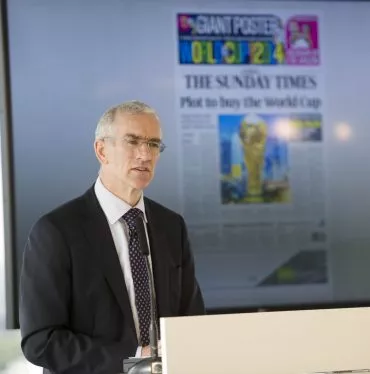About
News UK
Mike Darcey outlines in a Press Gazette blog why newspapers will play a dominant role in shaping the outcome of this year's general election:
Picture the scene. It’s 4.30 on a chaotic day of campaigning. The polls are tantalisingly close. Leadership is a core issue in the contest, and the legendary Times cartoonist, Peter Brookes, is putting the finishing touches to his latest portrayal of the Prime Minister. His brush is back in the water beaker. His hand is clutching a hairdryer - his trademark tool for sealing the satire.
A colleague has described his work as “deceptively nice”. His Guardian counterpart sums up the genre as “assassination without the blood”. What he sees is about to be shared, celebrated, denied, dismissed, discussed. There are countries where such work can land you in prison. Not here, thankfully, and long may that continue.
I cannot imagine our imminent election without cartoons. Nor could I imagine the campaign without a mountain of data, detailed analysis, pages of polemic prose, policy dissection, comment, criticism and crushing observations. It’s tough. But so it should be. In a mature democracy like ours, a free press is as critical as the referee in any serious sport. Without it the choices would be less stark, fault-lines blurred, reputations glossed over, outcomes disputed.
Without The Sun, Andrew Mitchell might still be among the political officer class, denying he ever dismissed a man prepared to take a bullet for him as a “pleb”.
Without the Telegraph, countless political candidates would be masquerading as custodians of the public purse having lined their pockets and duck ponds. We should all be grateful for their exposure of the expenses scandal. And we should all beware of politicians who want to put such journalism at their mercy.
I’m comforted by the thought that Heidi Blake and Jonathan Calvert could soon be turning their forensic skills towards a political target - shifting, perhaps, through the lists of party donors. If they have other plans, there will inevitably be others, because we need to know surely - whose cash is oiling the wheels of our democracy. And where that cash came from. The patient, painstaking Insight investigations at The Sunday Times have rightly landed them a cluster of recent gongs. They may not be popular with FIFA or the Qatari authorities but imagine a world where corruption at the core of major global decisions went unchecked.
Wind back a few months to the Scottish referendum and try to re-play that high stakes contest without the wake-up call provided by The Sunday Times poll days before the vote. One piece of reliable research from a respected newspaper saw diaries ditched, parliamentary dates abandoned and party differences set-aside to save the union. A later survey suggests newspapers were also the a strikingly popular source of information about that historic choice. Sixty per cent of voters - according to YouGov - relied on these established and trusted sources. Some 54 per cent turned to social media and 44 per cent based their decision on direct correspondence from the opposing camps. Without the press this May, many more crosses would merely be based on hunch, habit or party propaganda.
Most of us dread big decisions unless we are properly equipped to take them. And that’s the job of journalism.
I do not dismiss the role of broadcasters. TV will capture the drama, and document what the different parties are up to. Radio coverage will be intelligent, immediate and intimate. Social media will set the pace for claim and counter claim. But far from following on the sidelines, I’ll happily predict now that papers will again prove dominant in setting the agenda, clarifying the choice and shaping the outcome. Rightly so.


